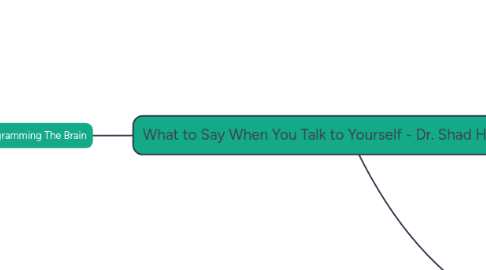
1. Programming The Brain
1.1. Looking For A Better Way
1.1.1. There are thousands of books, courses and teachers claiming to have the principles to success.. The people who have created these works are not generally lying.. The teachings would lead to "success" if we were able to follow them!
1.1.1.1. The vast majority of people who read a book, take a course or attend a seminar do not make lasting change
1.1.1.2. Something vital is missing from these teachings that would allow us to use them to their full potential
1.1.1.3. They only give us a small dose of information; enough to make us feel good and maybe even motivated in the moment.. but left to our own devices over time we revert back to our programming
1.2. Self Management Sequence
1.2.1. 1. Behaviour
1.2.1.1. Directly effects our success or failure
1.2.1.2. When we do the right things there is a better chance that things will work out for us
1.2.1.3. Created, controlled and determined by our feelings
1.2.2. 2. Feelings
1.2.2.1. Every action is filtered through our feelings and how we feel about something will determine or affect what we do or how well we do it
1.2.2.2. Feelings about anything will affect how you do it
1.2.2.3. Created, controlled and determined by your attitudes
1.2.3. 3. Attitudes
1.2.3.1. The perspective from which you view life
1.2.3.2. Attitude about anything will effect how you feel about it
1.2.3.3. Created, controlled and determined by your beliefs
1.2.4. 4. Beliefs
1.2.4.1. What we believe about anything will determine our attiudes about it
1.2.4.2. Does not requre something to be the way that we see it only that we believe that it is
1.2.4.3. Created and directed by our programming
1.2.5. 5. Programming
1.2.5.1. We believe what we are programmed to believe
1.2.5.2. This sets up our beliefs and the chain reation begins
1.3. Brain Programming
1.3.1. Your success or failure in anything, large or small, will depend on your programming - what you accept from others and what you say when you talk to yourself
1.3.1.1. As humans we want to create "rules for success" and in turn expect ourselves to follow them but that's not how the brain is wired
1.3.1.2. The brain simple believes what you tell it the most and what you tell it about you it will create
1.3.2. 148,000 No's
1.3.2.1. The first 18 years of your life you are told no 148,000 times think about the kind of mindset that puts you in
1.3.2.2. How many times are you told yes in that same timeframe?
1.3.2.3. Leading researchers have told us that as much as 77 percent of everything we think is negative, counterproductive and works against us
1.3.3. The Power of Repetition
1.3.3.1. To the brain repetition is an extremely convincing argument! In time we became what we most believed about ourselves..
1.3.3.1.1. Through neuroplasticity which is the brains ability to re-wire itself; if you take action on programming yourself with positive thoughts you can change who you are
1.3.4. The brain as a computer
1.3.4.1. Computer
1.3.4.1.1. Screen
1.3.4.1.2. Keyboard
1.3.4.1.3. Programming and storage device
1.3.4.2. Brain
1.3.4.2.1. Actions
1.3.4.2.2. Five Senses
1.3.4.2.3. Subconscious Mind
1.3.5. Our personal computers are constantly getting input from external sources; other people, media and even our subconscious mind confirming it's current beliefs
1.3.5.1. Most of us are completely unaware of this programming and therefore we live our lives running off other people's inputs; most of which don't work for us
1.3.5.2. These inputs are used by the media, politics and society to get us to fit into their mold for us; knowingly or unknowingly
2. Self Talk
2.1. All of us talk to ourselves all the time. Our self talk may be in spoken words or unspoken thoughts. It can take the form of feelings, impressions or even wordless physical responses. Most of the talk is unconscious and we are not even aware of it.
2.2. Reality
2.2.1. All thoughts are tied to something else that we already know. Like a network your brain creates mental filing cabinets and files your new ideas in where it fits best.
2.2.2. After filing the new idea away your brain will instantly tell you what to feel about this new thought and this in turn creates your reality.
2.2.3. The more you think about yourself in a certain way the more you see yourself in that same way and the more you think about anything in a certain way the more you will believe that is reality.
2.3. The Wall
2.3.1. Most self talk is unconscious
2.3.2. Most self talk is defeating
2.3.2.1. I have a bad memory
2.3.2.2. It's going to be another one of those days
2.3.2.3. I just know it won't work
2.3.2.4. etc..
2.3.3. This creates a wall of negativity that can be tough to get through when trying to make any lasting change..
